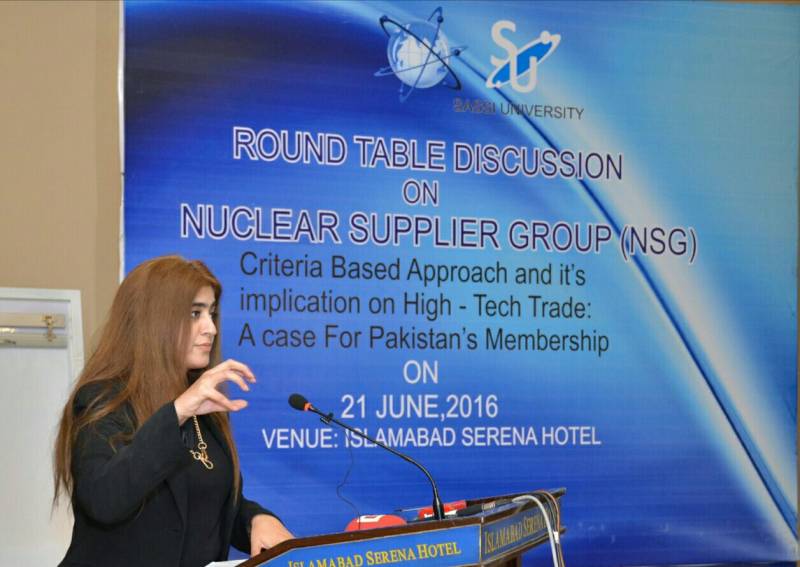India, Pakistan must be treated equally for NSG membership: Dr Maria Sultan
Shares

From our own correspondent
27 / June / 2016
On the 23rd of this month in Islamabad an important yet not well publicized round table discussion took place in Serena Hotel in Islamabad, organized by the South Asian Strategic Stability Institute (SASSI). Ms Tasnim Aslam, Additional Secretary, (United Nations & EC) and Mr. Awais Ahmad Khan Leghari, Chairman Standing Committee on Foreign Affairs were among the participants.
Speaking after an elaborate presentation on the membership parameters of the Nuclear Suppliers Group (NSG), Dr. Maria Sultan who heads SASSI stated that India does not fulfill the conditions which are mandatory for NSG’s membership which includes: Separation of Military and Civilian fuel cycle, Placement of all civilian nuclear facilities under IAEA safeguards, Indian fast breeder reactor program, Independent regulatory authority, Export control regulations, Illicit procumbent, Illicit trafficking and procumbent Diversion of civil nuclear assistance for weapon use, she also pointed out that after the nuclear incident of Fukushima in 2011, Pakistan carried out a complete assessment of its own nuclear power plants and facilities. In response to any threat, “Pakistan has revisited safety parameters, emergency preparedness and response, and operators’ training protocols and procedures.
She while discussing the Dismal Nuclear Safety Record highlighted the several nuclear incidents and few accidents over the years i.e. Mayapuri Radiation Accident in West Delhi in 2010 was of Level 4 on International Nuclear and Radiation Event Scale (INES), eight people were hospitalized as a result of radiation exposure, and later one died. While Pakistan has good record of Pakistan’s Non-Proliferation Credentials, Current Nuclear Energy Production, Nuclear Power Reactors Under Construction and Planned Safety And Security of Nuclear Power Plants. She further stressed the need to treat India and Pakistan’s respective bids for the NSG membership on the same scale. Ms Tasnim Aslam, Additional Secretary, (United Nations & EC) said that we are compelled to increase the percentage of clean energy including nuclear energy.
Pakistan maintained consistent engagement with nuclear issues since 2003 and held meetings in 2011, 2012 and 2015 regarding this Nuclear Suppliers Group issue and found these interactions very useful throughout this period. She said that we completed process of Pakistan’s formal adherence to NSG guidelines, so Pakistan aligned itself to the global Non Proliferation Regime. On 14th May we sent a formal a letter to IAEA for our membership in Nuclear Suppliers Group. Pakistan has strong credentials meaning that Pakistan fulfills all the conditions i.e. effective export control regime, technical experience, capability, and power plants, safe and secure nuclear program, agriculture and biotechnology centers. She further stated that, we have more than 42 years of safeguarded experience of nuclear applications and we can supply them for safe uses.
All of Pakistan’s nuclear existing nuclear facilities are under IAEA safeguards. Pakistan has excellent safeguard and it takes nuclear safety and security very seriously and accord them as its highest priority. Pakistan applies international standards and rules on nuclear safety and security and has recently ratified CPPNM. She said that there is a whole body dealing with export of nuclear and conventional items in Pakistan. She further pointed out that eight of India’s nuclear reactors are not under IAEA safeguards. She said that if NSG’s membership is based on criteria then it will safe its prestige which was lost in 2008, but any discrimination will be a blow to the non-proliferation regime. International community should avoid any step that affects the regional and international peace. Even handed and non-discriminatory will be juncture for strengthening Non Proliferation regime.
Mr. Awais Ahmad Khan Leghari, Chairman Standing Committee on Foreign Affairs said that Pakistan has much strong case than India regarding the membership o NSG. He said that India has already second strike capability, trying to make intercontinental ballistic missiles, space based system, missile defense acquisitions with the help of the West and US. India is pursuing naval capabilities to enter in Indian Ocean. India’s nuclear intentions are clear that it wants to gain the great power status and its missile defense is intended to protect itself from any retaliatory action, so Pakistan is in a very insecure position.
He raised questions that why the west is keeping eyes close to this issue and why UN is not taking into consideration the insecurities of Pakistan as it is insecurity for the whole region. He said that the imbalance is created by the US. He said that we do not appreciate this discriminatory manner towards Pakistan vis-à-vis India. International community must have a look into it as it is against the fair attitude towards any country. The experts concluded that Pakistan’s Non proliferation credentials exhibit a policy of state dedication and decades of commitments, Pakistan’s ranking on global nuclear safety index is rising and therefore it NSG bid must be treated equally as other non NPT states like India.
